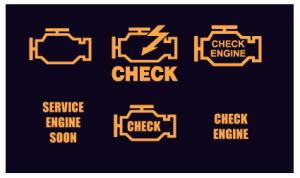Check Engine Light
7 Reasons Why Your Check Engine Light Is On
1.Spark Plugs and Wires
The spark plug seals the combustion chamber and initiates combustion in your engine. When the plugs are failing, the spark plugs misfire. When you accelerate your car you will start to feel a jolt. Spark plugs fail over time and need to be replaced every 25,000-30,000 miles.
2. Oxygen Sensor
An oxygen sensor monitors the unburned oxygen from the exhaust. This is important to know how much fuel is burned. A faulty sensor not only reduces gas mileage, it also increase emissions. If you don’t replace it your catalytic convertor may bust which is much more expensive to fix than the sensor itself!
3. Ignition Coils
Over time Ignition coils can malfunction due to age and high under-hood temperatures. If not replaced, it can affect other systems, such as the pricey catalytic converter.
4. Catalytic Convertor
The catalytic convertor works to reduce exhaust gases. It converts carbon monoxide and other harmful materials into harmless compounds. If your catalytic convertor is failing, you’ll notice that it won’t go any faster when you push the gas. You will not be able to keep the car running if this is failing.
5. Mass Airflow Sensor
The mass airflow sensor tells the car’s computer to add the proper amount of fuel based on the air coming through to the engine. A faulty one can increase emissions, cause the car to stall, and decrease gas mileage. If this happens your air filter may need replacing. If your sensor s not replaces over time your car will start stalling a lot.
6. Loose or Faulty Gas Cap
When a gas cap is loose or cracked, fuel vapors leak out and throw the whole fuel system off. This too causes a reduction in gas mileage and increases emissions.
7. Dead Battery
The car battery is crucial to starting the engine and getting the car moving. Your engine can stop completely if the battery is in bad shape. It is important that batteries be replaced every three years, but extreme temperatures can shorten their life.

